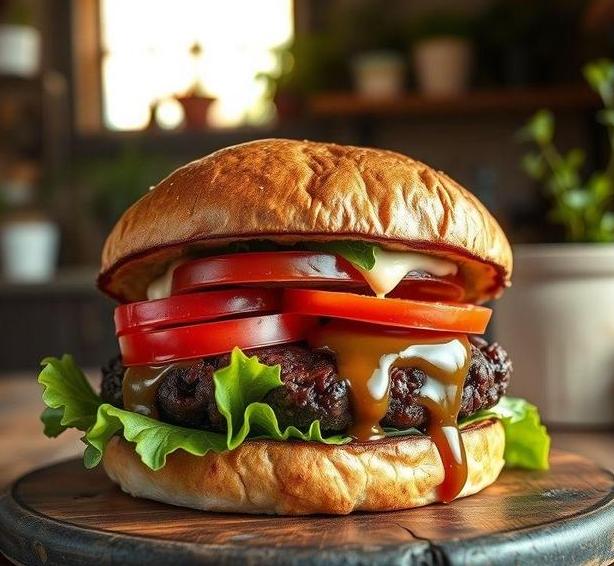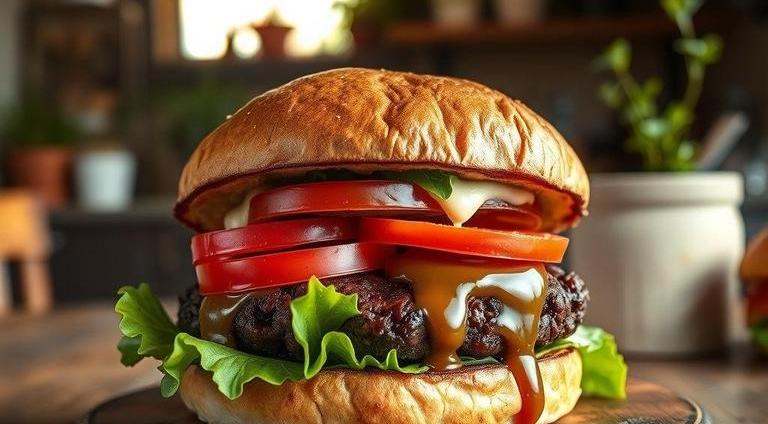Venison burgers have been a popular alternative to traditional beef burgers for many years, particularly among hunters, outdoors enthusiasts, and those looking for a leaner, more sustainable source of protein. The rich, earthy flavor of venison, combined with its low-fat content, makes for a delicious, healthy burger option that is both tender and flavorful. But, like all meats, venison can go bad if not properly stored or cooked.
Whether you’re working with fresh venison or venison burgers you’ve already made, it’s essential to understand how to handle and store them to avoid any unpleasant surprises. Spoiled venison can lead to foodborne illnesses, which is a risk no one wants to take. This article delves into the nitty-gritty of venison burger shelf life, common signs of spoilage, and best practices for storage. By the end of this read, you’ll be well-prepared to keep your venison burgers safe, fresh, and delicious.
Can Venison Burger Go Bad?
Absolutely. Like any type of meat, venison is susceptible to spoilage if it’s not stored properly or consumed within the right timeframe. Venison burgers, being made of ground meat, are especially prone to spoiling quickly because the grinding process increases the surface area, giving bacteria more places to grow. This makes ground venison, including venison burgers, highly vulnerable to contamination from pathogens like E. coli, Salmonella, and Listeria, if not handled with care.
Factors That Can Make Venison Burgers Spoil
- Temperature: If venison burgers are left out at room temperature for too long, bacteria can multiply rapidly. The USDA recommends that ground meats, including venison burgers, should not be left out for more than 2 hours.
- Exposure to air: Oxygen can accelerate the breakdown of meat. The longer venison is exposed to air, the faster it will deteriorate.
- Improper storage: Not refrigerating or freezing venison burgers immediately after purchase or preparation can lead to spoilage.
Shelf Life For Venison Burger

The shelf life of venison burgers varies based on how they’re stored and whether they are raw or cooked. Here’s a breakdown:
-
Raw Venison Burger
- If stored in the refrigerator (at or below 40°F/4°C), raw venison burgers can typically last 1-2 days. After this, bacterial growth can cause the meat to spoil. It’s always best to cook them sooner, especially if they’ve been ground fresh.
- If frozen immediately after grinding or purchase, they can last up to 6 months in the freezer without significant loss of quality. However, for the best taste and texture, it’s recommended to consume them within 3-4 months.
-
Cooked Venison Burger
- After cooking, venison burgers can last for about 3-4 days in the fridge. To ensure optimal taste and safety, try to eat them within this time frame.
- When frozen, cooked venison burgers last 3-4 months. However, they may lose some of their juiciness and tenderness over time, so try to consume them sooner for the best flavor.
Common Signs Of Spoilage
Knowing the signs of spoilage is key to ensuring you don’t accidentally eat bad venison. Here’s what to look for:
-
Unpleasant Smell
- Fresh venison has a slightly gamey, earthy aroma. However, if it starts to smell sour or rancid, it’s a definite sign of spoilage. The smell can be overpowering and unpleasant, sometimes akin to ammonia.
-
Change In Color
- Venison burgers that have gone bad will often change color. Fresh venison is typically a deep, reddish-brown. As the meat spoils, it may take on a grayish, brownish, or even greenish hue, indicating bacterial growth. If the meat looks discolored or dull, discard it.
-
Slimy Texture
- Fresh venison burgers should feel firm and slightly moist. If the surface becomes slimy or sticky, it is a clear sign that bacteria are present, and the meat should not be eaten.
-
Off Taste
- If you happen to notice a strange or sour taste when cooking or eating venison, it is an indication that the meat has spoiled. This can be a telltale sign even if the meat looks fine on the outside.
-
Excessive Fluid
- While a bit of moisture is natural in raw venison burgers, excessive liquid pooling around the meat, especially when thawing, could signal bacterial contamination.
How To Store Venison Burger?

Proper storage is essential for extending the shelf life and ensuring the safety of your venison burgers. Follow these guidelines to keep them fresh:
-
Refrigeration
- For raw venison burgers: Store them in an airtight container or tightly wrapped in plastic wrap. Place them on the bottom shelf of the fridge to avoid contamination from other foods.
- For cooked venison burgers: Let the burgers cool completely before storing them in an airtight container or tightly wrapped in aluminum foil or plastic wrap. This helps prevent bacterial growth while also keeping the burgers from drying out.
-
Freezing
- Raw venison burgers: If you don’t plan to cook your venison within 1-2 days, freezing is your best option. For optimal quality, wrap the burgers in plastic wrap or wax paper, followed by a layer of aluminum foil, and place them in a freezer-safe bag or container. This will prevent freezer burn.
- Cooked venison burgers: Allow them to cool to room temperature before placing them in a freezer-safe bag or airtight container. For easy thawing later, you can wrap them individually. Label them with the date so you can track how long they’ve been frozen.
-
Thawing
- In the refrigerator: Thaw frozen venison burgers in the fridge for 12-24 hours before cooking. This method keeps the meat at a safe temperature and prevents bacteria growth.
- In the microwave: If you’re in a rush, you can use your microwave’s defrost setting, but be sure to cook the burgers immediately after thawing.
-
Avoid Refreezing
- If you’ve already cooked venison burgers and thawed them, it’s best not to refreeze them. Refreezing can compromise texture and flavor and may encourage bacterial growth.
Expert Tips
- Marinate for Longer Freshness: Marinating your venison burgers before freezing them can enhance their flavor and help preserve moisture during storage. A good marinade can also slow down bacterial growth.
- Use Vacuum Sealing: For optimal freezer storage, use a vacuum sealer to remove air and prevent freezer burn. This can keep your venison burgers fresh for up to 12 months in the freezer.
- Know When to Cook: Don’t wait too long to cook your venison burgers. The longer you store them in the fridge, the more risk you run of them spoiling. If you can’t cook them right away, freeze them.
- Use a Meat Thermometer: Always cook venison burgers to an internal temperature of 160°F (71°C) to ensure any harmful bacteria are killed.
FAQs
How Long Does A Venison Burger Last In The Fridge?
A venison burger can last in the fridge for up to 1-2 days if stored properly in an airtight container. It is recommended to cook or freeze it within this time frame to avoid spoilage.
What Are The Signs That A Venison Burger Has Gone Bad?
Signs that a venison burger has gone bad include a sour or off smell, discoloration (such as grayish or greenish spots), and a slimy texture. If any of these signs are present, the burger should be discarded.
Can I Eat A Venison Burger That Has Been Left Out Overnight?
No, venison burgers should not be eaten if left out at room temperature for more than 2 hours. Bacteria multiply quickly at room temperature, increasing the risk of foodborne illness.
How Can I Store Venison Burgers To Prevent Spoilage?
To prevent spoilage, store venison burgers in an airtight container or tightly wrapped in plastic wrap or aluminum foil. If you’re not planning to cook them soon, freezing them is the best option to extend their shelf life.
Can Venison Burgers Be Frozen?
Yes, venison burgers can be frozen. They should be wrapped tightly in plastic wrap, then placed in a freezer bag or airtight container. When frozen properly, they can last for up to 3-4 months.
How Do I Know If A Frozen Venison Burger Is Still Good?
If the venison burger has been stored correctly in the freezer, it should still be good when thawed. Signs of freezer burn, such as dry, discolored patches, may affect the quality but won’t necessarily make the burger unsafe to eat.
Is It Safe To Eat Venison Burgers That Are Past The ’sell By’ Date?
The ’sell by’ date on packaging is a guideline for optimal quality. If the venison burger has been stored properly, it may still be safe to eat for a few days after this date, but the quality may have decreased.
Can Venison Burgers Be Contaminated With Bacteria?
Yes, like all raw meats, venison burgers can be contaminated with bacteria such as Salmonella or E. coli. Proper handling, cooking, and storage are essential to prevent contamination and foodborne illness.
How Should I Cook Venison Burgers To Ensure They Are Safe To Eat?
Venison burgers should be cooked to an internal temperature of 160°F (71°C) to kill any harmful bacteria. Using a meat thermometer is the best way to ensure the burger is cooked thoroughly.
Can I Use Venison Burger Meat That Has A Strange Odor?
No, if venison burger meat has a strange or unpleasant odor, it is an indication that it has spoiled and should not be consumed. Always discard meat that smells off to avoid foodborne illness.